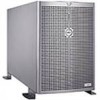Dell PowerEdge 6800 Upgrade the BIOS Before Upgrading Your System (.pdf) - Page 9
Table 1-3., LCD Status Messages, Line 1, Message, Causes, Corrective Actions, SYSTEM, SYSTEM NAME - e1000 error
 |
View all Dell PowerEdge 6800 manuals
Add to My Manuals
Save this manual to your list of manuals |
Page 9 highlights
Table 1-3. LCD Status Messages Line 1 Message SYSTEM ID E0000 E1000 E1000 E0119 E0119 Line 2 Message Causes Corrective Actions SYSTEM NAME SYSTEM ID is a unique name, five characters or less, defined by the user. SYSTEM NAME is a unique name, 16 characters or less, defined by the user. This message is for information only. You can change the system ID and name in the System Setup program. See your User's Guide for instructions. The system ID and name display under the following conditions: • The system is powered on. • The power is off and active POST errors are displayed. OVRFLW CHECK LOG LCD overflow message. A maximum of three error messages can display sequentially on the LCD. The fourth message displays as the standard overflow message. Check the SEL for details on the events. FAIL SAFE Failsafe event. Capture the event log and see "Getting Help" in your Installation and Troubleshooting Guide. MISCONFIG Missing or improperly installed VRMs. See "Installing a Processor VRM" in your Installation and Troubleshooting Guide. If the VRMs appear to be properly configured and installed, see "Getting Help" in your Installation and Troubleshooting Guide. TEMP AMBIENT Ambient system temperature is out of acceptable range. See "Troubleshooting System Cooling Problems" in your Installation and Troubleshooting Guide. TEMP PROC # The specified processor is out See "Troubleshooting System of acceptable temperature range. Cooling Problems" in your Installation and Troubleshooting Guide. Information Update 7















